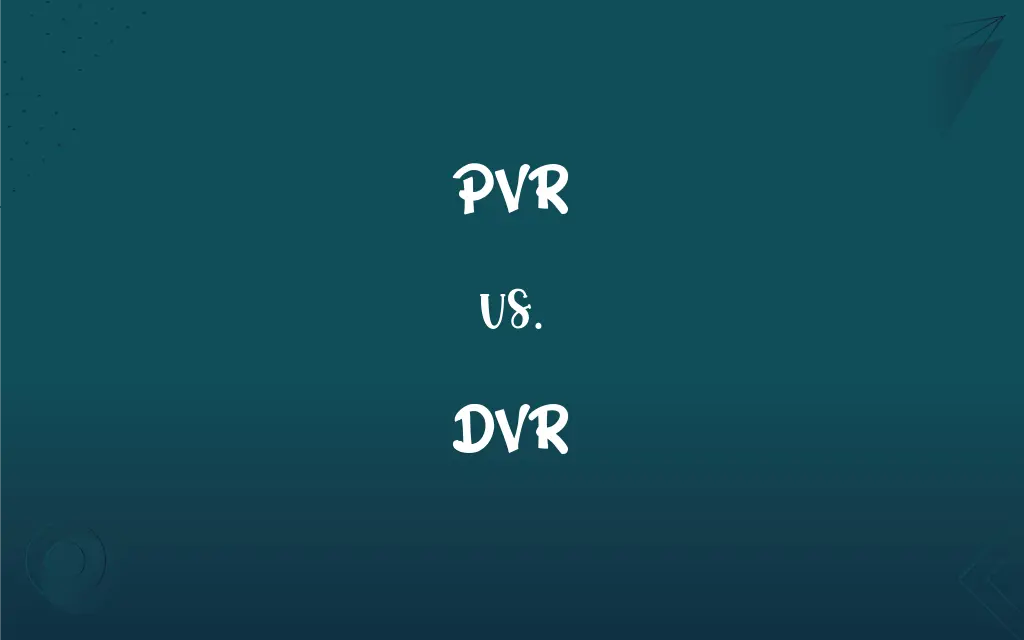PVR vs. DVR: What's the Difference?
Edited by Aimie Carlson || By Janet White || Published on November 21, 2024
PVR (Personal Video Recorder) is a device primarily used to record TV content for personal use, while DVR (Digital Video Recorder) records and stores digital video from various sources.

Key Differences
PVR and DVR are both types of recording devices, but they have different primary uses and features. PVR, standing for Personal Video Recorder, is specifically designed for recording television programs. It typically comes integrated with a set-top box provided by television service providers and offers features like live TV pausing and scheduled recording. DVR, or Digital Video Recorder, is a broader term that encompasses devices and software that record video in a digital format. While DVRs can also record television content, they are not limited to this and can be used with various video sources.
The functionality of PVRs is often tailored to enhance the TV viewing experience. They are equipped with user-friendly interfaces for scheduling recordings, managing stored content, and often offer features like skipping commercials. DVRs, on the other hand, may offer a wider range of functionalities, including recording from multiple sources like cameras, security systems, and even direct video inputs.
In terms of technology, PVRs are typically tied to a specific service provider and may have limitations based on the provider's offerings. They often use proprietary software and are designed to work seamlessly with the provider's ecosystem. DVRs are more versatile and can come in various forms, including stand-alone devices, software for computers, or as part of a larger multimedia system.
PVRs are often considered more consumer-friendly, especially for non-tech-savvy users, due to their integration with TV services and ease of use. DVRs, while offering more flexibility and features, may require more setup and technical understanding, particularly when used for purposes other than recording TV, like surveillance.
The storage capacity and management of recordings can differ between PVRs and DVRs. PVRs usually have set storage limits and straightforward management tailored to TV programs. DVRs may offer more advanced storage solutions, like external hard drive support, network-attached storage, and sophisticated file management systems.
ADVERTISEMENT
Comparison Chart
Primary Use
Recording TV programs
Recording digital video from various sources
Integration
Integrated with TV service providers
Stand-alone or part of multimedia systems
Functionality
User-friendly, tailored for TV viewing
Versatile, suitable for multiple applications
Technology
Often proprietary and provider-specific
Broadly compatible with various video inputs
Storage Management
Fixed storage, simple management
Flexible storage, advanced management options
ADVERTISEMENT
PVR and DVR Definitions
PVR
Integrated with set-top boxes.
Our PVR comes with the cable subscription.
DVR
Advanced storage solutions.
The DVR connects to an external hard drive for additional storage.
PVR
Features like live TV pausing.
I paused the game on the PVR to answer the phone.
DVR
More flexible and feature-rich.
The DVR offers more recording options than our old device.
PVR
User-friendly interface for scheduling recordings.
The PVR makes it easy to schedule recordings of all my shows.
DVR
Records digital video in various formats.
The DVR is set up to record the security camera footage.
PVR
Device for recording TV content.
I set the PVR to record my favorite show tonight.
DVR
Can be used with multiple video sources.
Our DVR records from both the satellite feed and our cameras.
PVR
Tailored for enhancing TV viewing experience.
The PVR has improved our family's TV watching experience.
DVR
Suitable for both TV and surveillance recording.
We use the DVR for both watching shows and monitoring our property.
FAQs
Can PVRs record live TV?
Yes, PVRs can record live TV and offer features like pausing live TV.
Are DVRs limited to TV program recording?
No, DVRs can record from multiple sources, including security cameras.
Do PVRs come with TV subscription services?
Often, PVRs are integrated with set-top boxes from TV service providers.
What does PVR stand for?
PVR stands for Personal Video Recorder.
Is a PVR easy to use?
PVRs are generally user-friendly, with simple interfaces for TV viewers.
Do DVRs offer more storage options?
Yes, DVRs may have flexible storage options like external drives.
Are DVRs more technologically advanced than PVRs?
DVRs often offer more advanced features and broader compatibility.
Do PVRs require a specific service provider?
PVRs are usually tied to specific TV service providers.
What is a DVR used for?
DVR is used for recording digital video from various sources.
Is it easy to transfer recordings from a PVR?
This varies by model, but some PVRs offer easy transfer options.
Can I schedule recordings on a PVR?
Yes, PVRs allow for easy scheduling of TV program recordings.
Can I watch one program and record another on a PVR?
This depends on the PVR model and its capabilities.
Can a DVR be used for home security?
Yes, DVRs are often used in home security systems.
Are PVRs good for skipping commercials?
Many PVRs offer features to skip or fast-forward through commercials.
Do DVRs support live TV pausing?
Some DVRs offer this feature, especially those designed for TV recording.
Are PVRs expensive?
The cost varies, but PVRs provided with TV services are often part of the subscription package.
Can DVRs manage large video files efficiently?
Yes, many DVRs are equipped to handle large video files and storage management.
Can I use a DVR with my computer?
Yes, there are DVR software and devices that can be used with computers.
Is the video quality the same on PVRs and DVRs?
Video quality depends on the device's specifications, but both can offer high-quality recording.
Are there any subscription fees for using a DVR?
Stand-alone DVRs typically don't have subscription fees, but service provider DVRs might.
About Author
Written by
Janet WhiteJanet White has been an esteemed writer and blogger for Difference Wiki. Holding a Master's degree in Science and Medical Journalism from the prestigious Boston University, she has consistently demonstrated her expertise and passion for her field. When she's not immersed in her work, Janet relishes her time exercising, delving into a good book, and cherishing moments with friends and family.
Edited by
Aimie CarlsonAimie Carlson, holding a master's degree in English literature, is a fervent English language enthusiast. She lends her writing talents to Difference Wiki, a prominent website that specializes in comparisons, offering readers insightful analyses that both captivate and inform.







































































